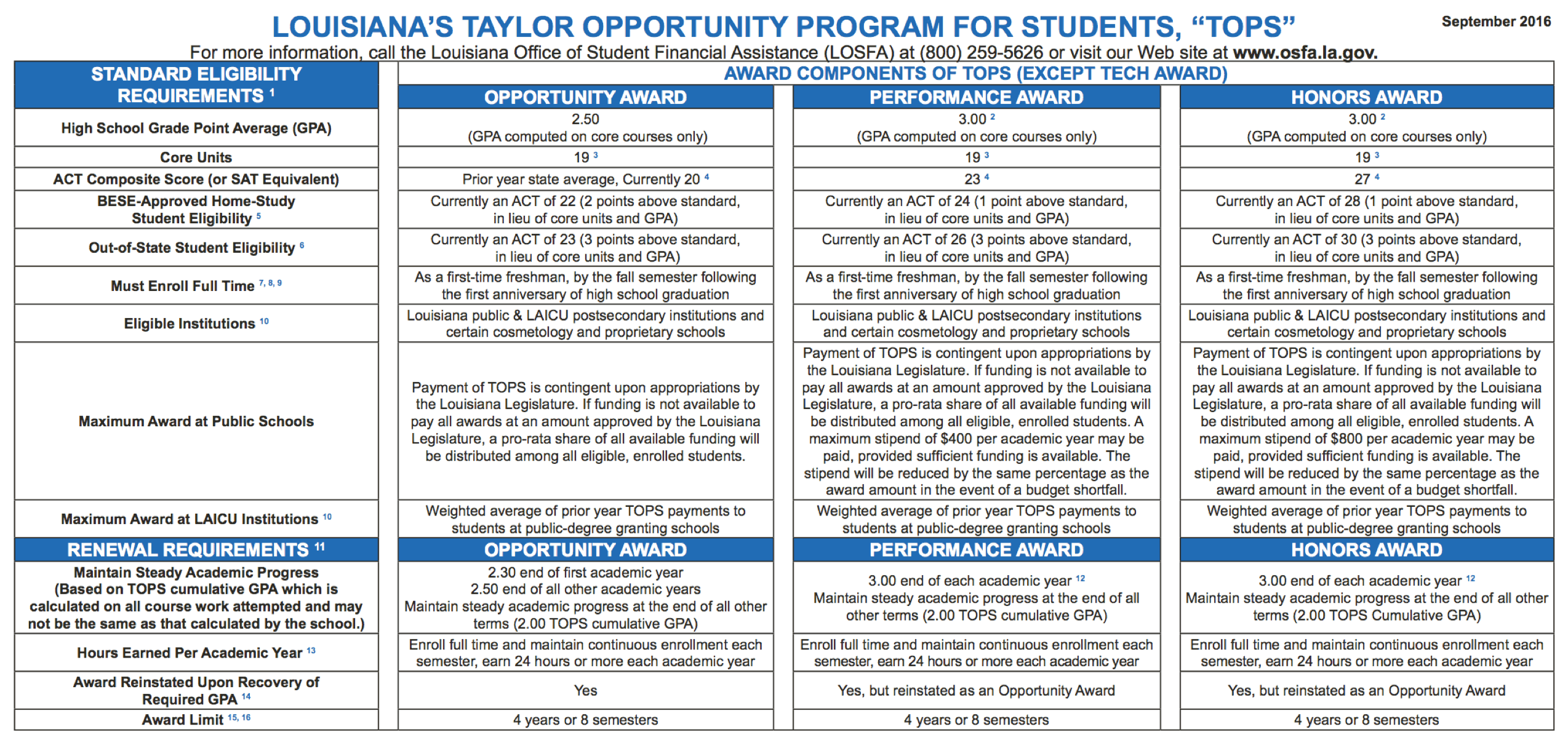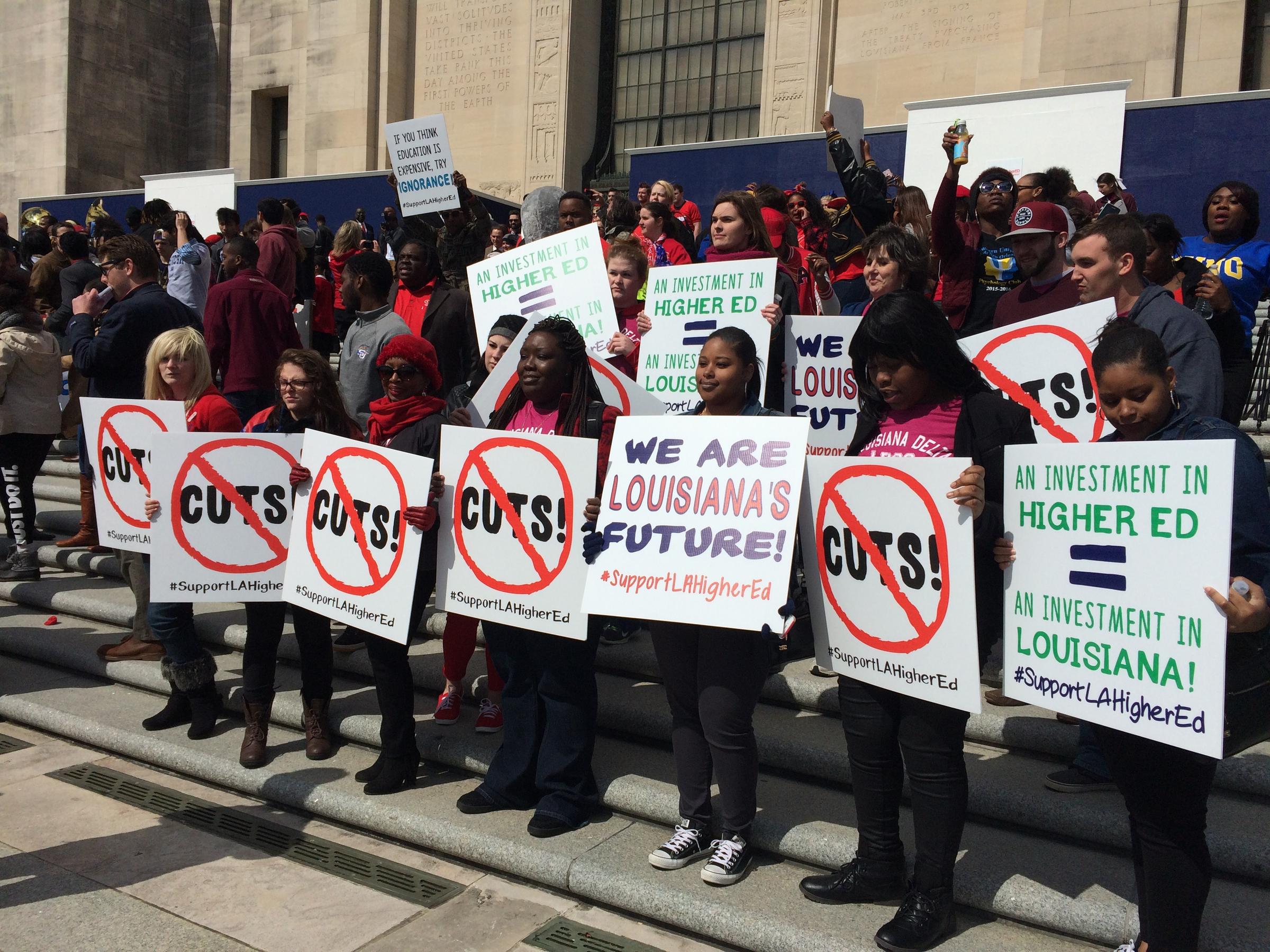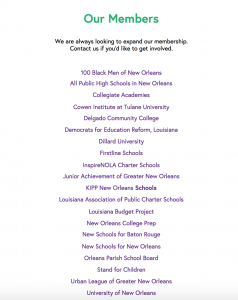For almost 20 years, Louisiana high school students who graduated with a 2.5 G.P.A. and a score of 20 on the ACT exam were eligible for a TOPS scholarship that would cover the cost of tuition at a state college or university. Not only did the TOPS program reward students’ academic achievement, but it allowed thousands of low-income students to go to college, earn a degree, and break the cycle of poverty.
Enlarge

Needless to say, the promise of free college tuition made TOPS hugely popular among voters and therefore legislators made sure the program was fully funded year after year. However, that changed last spring when lawmakers were struggling to close a $750 million budget shortfall. With few options to bridge the gap, it became clear that the once-sacred $296 million TOPS program was no longer considered untouchable.
As legislators began lining up behind a proposal to cut TOPS awards across-the-board by 30% (meaning that TOPS recipients would have to make up the difference, as much as $2000 per semester in tuition), I wrote an essay urging them to take a different approach, one that could still save the state money without creating an insurmountable financial barrier for poor students.

My suggestion was that the TOPS program use a sliding scale to determine the amount of individual TOPS awards. Everyone who met the academic qualifications for TOPS would still receive a scholarship, but the amount of that award would vary based on financial need. Students from affluent families with the means to pay for part of their tuition would receive a smaller amount than those farther down the socio-economic ladder, with TOPS continuing to cover full tuition for students from families below the poverty line.
Naturally, I thought it was a brilliant idea (shocker! 😉 ), but lawmakers apparently didn’t since they went ahead with their plan to cut TOPS. As a result, more than 50,000 college students across Louisiana were left scrambling to cover tuition payments. Although colleges and universities tried to help students secure grants and loans to ease the burden, there were undoubtably many low-income TOPS recipients who were forced to drop out of school because they could no longer afford it.
TOPS equity gains traction among advocates
Although my efforts to the persuade lawmakers fell on deaf ears, the sliding-scale concept has slowly been gaining support among education advocates over the past year. In May, the Cowen Institute at Tulane University issued a report recommending that TOPS use a sliding scale to allocate awards. And Doug Harris, an economist and the director of the Education Research Alliance, also endorsed the approach in an op-ed in The Advocate last fall.

Now, a number of the state’s leading education organizations have come together to form a new group – the Louisiana College Access Alliance (LCAC) – that will be focused on two key priorities for the upcoming legislative session: 1) restoring full funding to the TOPS program; 2) if full-funding is not possible, then to prioritize funding for low-income students who could not otherwise afford college.
Specifically, LCAC will be lobbying lawmakers to support House Bill 390, a proposal from State Rep. Gary Carter (D-New Orleans) that would use a sliding scale to determine TOPS scholarship amounts, with the largest awards going to students with the greatest financial need. The bill would also restore full TOPS awards to students with an ACT score of 30 or higher, in an effort to persuade our state’s best and brightest to remain in-state.

A bill that all sides can support
House Bill 390 is a proposal that state legislators of all stripes – whether Democrat or Republican, liberal or conservative – can and should support. All students who meet the academic requirements will continue to receive a TOPS scholarship under the plan, providing recipients with a steep discount on their college education. Most importantly, it will ensure that TOPS remains a pathway to a college degree – and a better life – for students of all backgrounds.
How can you help? Find your representatives in the Louisiana Legislature HERE and urge them to support House Bill 390. You can also track the efforts of the Louisiana College Access Coalition over the coming weeks on Twitter and Facebook.
Read more on this story:
Don’t Let TOPS Changes Become Barriers For Poor Students | PE + CO
It’s safe to say that when it comes to K-12 education policy, Governor John Bel Edwards and I often disagree. Nevertheless, I wholeheartedly support several of the Governor’s other policy objectives, particularly those which seek to improve the welfare of low-income families, such as his efforts to increase the state’s Earned Income Tax Credit and raise the minimum wage, as well as his expansion of Medicaid.


make a combined family income of 100k, which means 50k per parent. Why should any student with the academic requirements be penalized.
Just bc your family is not poor, does not mean you should not be rewarded with financial accolades for your success. You are a talking point
Posting a picture of meaningless statistics does your argument 0 good. Makes you look like a rhetoric. 41% so the majority does not
So maybe I can’t pass a standardized test anymore, but I swear that the main idea of your article is a bit different than the main idea of the one sentence post, so I’m not sure where you stand exactly on this.
The simplicity of TOPS as it was was certainly part of its brilliance.